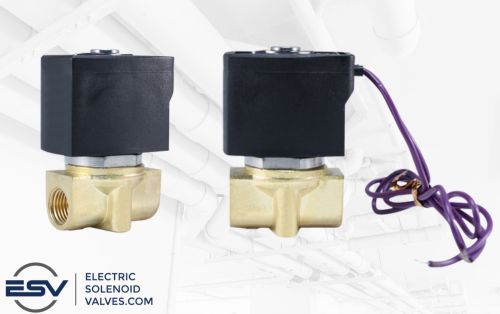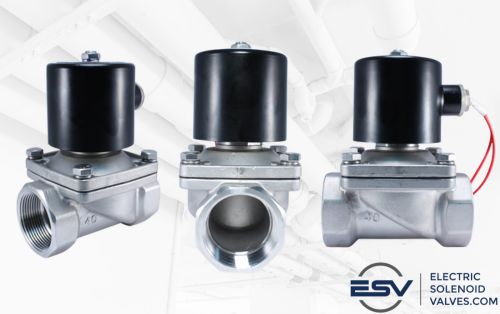May 20th 2024
Brass Vs Steel Solenoid Valves for Industrial Applications - Which Should You Choose?
Solenoid valves are essential components in automated industrial fluid control systems. Selecting the right valve material is crucial during the design process. Two of the most common materials of solenoid valves to choose from are brass and steel, each with its unique advantages and limitations.
This guide dives into the characteristics of brass and stainless steel solenoid valves. We'll go over differences in chemical resistance, temperature and pressure tolerance, cost-effectiveness, and maintenance requirements. This information should enable you to make an informed decision when selecting solenoid valves from the Electric Solenoid Valves catalog.
Understanding Solenoid Valves
Solenoid valves are electromechanical devices that use a solenoid coil to control fluid flow. When powered, a magnetic field is generated by the solenoid coils that actuate the plunger inside of the valve This action opens or closes the fluid flow path. Their ability to operate quickly and accurately makes them essential for various industrial fluid control applications.
Solenoid valves are available in different sizes and manufactured from various materials. Each design and material choice are adapted to particular application areas. The type of materials used to fabricate solenoid valves impacts their durability and performance when subjected to various fluid media. Some valve materials perform poorly in demanding environments - like chemical pipelines operating under high pressure and temperature. Other materials may deform, altering the shape and sealing capabilities of the solenoid valves. One must carefully evaluate solenoid valve material properties vis-a-vis the operating environment.
Brass Solenoid Valves
Brass is an alloy containing zinc and copper in different proportions. Copper is a more predominant material, with a composition between 55 and 90%. Brass contains around 5-45% zinc. Copper enhances the electrical and thermal conductivity properties of brass. It can significantly improve its corrosion resistance capabilities. Zinc, though available in lower quantities, enhances the ductile properties of brass. It makes it easier to machine brass to achieve unique flow patterns in solenoid valves. Zinc also extends the durability of brass solenoid valves.
Brass may contain other additional elements in limited proportions to improve their physical properties and adapt them to specific environments. Some of these elements are lead, nickel, manganese, and tin. How do these material compositions affect the performance of brass solenoid valves?
Advantages of Brass
- Media Compatibility - Brass is compatible with various industrial fluids. It can provide adequate chemical resistance to corrosion in pipelines conveying water and non-acidic fluids. This makes solenoid valves made from brass suitable for environments with high moisture content and pipelines conveying mildly corrosive fluid media.
- Machinability - Brass is easy to fabricate. The ease of machining allows valve manufacturers to achieve precise shapes and valve designs. This ease of machining results in smooth internal surfaces that reduce fluid flow resistance and frictional corrosion, as well as tight tolerances essential for reliable valve performance.
- Thermal and Electrical Conductivity - Brass has good thermal and electrical conductivity properties, with the valve body acting as a medium for heat management and dissipation. This is crucial for applications where precise temperature control is required such as HVAC and solar water heating systems. The excellent electrical conductivity property of brass is beneficial, considering solenoid valves rely on electrical current to operate.
- Cost-effectiveness - Brass is relatively cheap compared to specialized materials for valve fabrication. Since brass is also easy to machine, the production cost for these valves become cheaper. Brass solenoid valves are durable, and users do not need to worry over frequent valve replacement provided their operations are restricted to allowable limits.
Disadvantages of Brass
- Limited Chemical Resistance - Brass can rapidly degrade in specific fluid environments. The material may not provide adequate defense against corrosion in acidic environments. These valves can lose their integrity when used to regulate the flow of corrosive chemical media over time.
- Risk of Dezincification - Dezincification is a condition where zinc in brass gradually leaches from the alloy. While this is a long-term process, it accelerates if the valve is exposed to particular fluid environments. This leads to loss of structural integrity and the overall weakening of the valve material. Dezincification becomes prevalent if a brass valve regulates the flow of acidic fluid media or in pipelines handling alkaline water.
- Pressure and Temperature Limitations - Brass has a relatively lower melting point and pressure endurance than stainless steel, limiting. them to low-pressure and temperature applications. Exposing brass valves to high-temperature fluid applications increases their risk of premature failure due to deformation due to elevated heat. The valves may not also accommodate the high pressure associated with some fluid applications like petrochemical manufacturing and might rupture.
Steel Solenoid Valves
Steel is available in different types and grades, making it viable for fabricating valves for different fluid applications. Carbon steel, which contains around 2.1% carbon content, is commonly used for general-purpose industrial valves. In such applications, there is little attention to corrosion resistance. Stainless steel (304 and 316 stainless steel) valves are more predominant in applications where corrosion resistance is a top priority. Stainless steel contains additional elements like chromium, nickel, and molybdenum, which increase the structural strength, chemical resistance, and corrosion resistance properties. Steel has different benefits and shortcomings, each influencing its viability in industrial fluid applications.
Advantages of Steel
- Structural Strength and Durability - Steel’s excellent structural strength means it can withstand extreme mechanical stress without losing its integrity and operating properties. Valves fabricated from steel can endure repetitive mechanical stresses subjected to it over a long operating life, even in highly demanding fluid environments like oil and gas production. Steel solenoid valves are preferable for highly challenging environments and can guarantee long-term efficiency in harsh environments.
- Corrosion Resistance Properties - Stainless steel (304 and 316) have exceptional corrosion resistance properties. Valves fabricated from these steel grades can resist media and environmental corrosion. They retain their surface strength and toughness despite exposure to harsh environments popular with chemical processing facilities, seawater, and chemical processing pipelines.
- Chemical Compatibility - Stainless steel is compatible with multiple chemicals and industrial fluids. They can effectively facilitate the regulation of fluids bearing different chemical properties. It makes steel solenoid valves preferable for fluid applications across various industries.
- Hygienic Properties - Some hygiene-sensitive industries, like food processing and pharmaceutical industries, have strict requirements for valve fabrication materials. Stainless steel has remarkable hygiene properties and is easy to clean and sterilize, making them preferable for fabricating automated valves for hygiene-sensitive industrial applications.
- High Pressure and Temperature Tolerance - Steel valves are critical safety features for high-pressure and temperature fluid applications. Steel can accommodate a wide temperature range - exhibiting predictable strength for low-temperature (cryogenic) applications and high-temperature applications like steam regulation. Steel valves can also accommodate high pressure associated with some industrial applications without losing their structural strength.
Disadvantages of Steel
- High Production Costs - Steel, unlike brass or plastic valves, is costly to machine and fabricate and to acquire pure steel. Its production processes are also slower and energy consuming. This means the cost of a steel solenoid valve can be higher than a brass solenoid valve of the same size. Steel is tough and can take longer to fabricate to achieve the precision and tolerance levels required.
- Corrosion Threats in Specific Applications - Although steel has remarkable media compatibility properties, there are few industrial applications where steel solenoid valves may exhibit lower performances over time. Steel can suffer crevice corrosion and pitting when used to regulate the flow of fluids with high chloride concentrations. Steel solenoid valves may be unsuitable for fluid flow control in seawater pipelines. The corrosive effects of fluids with high chloride concentrations threaten the integrity and effectiveness of high-grade steel like 304 and 316.
- Susceptibility to Scaling - Steel valves can be susceptible to scaling and mineral deposition in specific water-based industrial applications. The gradual deposition of scale and mineral deposits can inhibit valve performance, reducing its efficiency with time. Regular cleaning and maintenance are necessary to ensure valves remain in optimal operating conditions.
Guide For Choosing the Right Solenoid Valve Material
Choosing the correct valve for your application goes beyond considering budgetary constraints and desired performance metrics. There is a need for a deliberate and exhaustive analysis of fluid properties, operating conditions, and desired flow control effectiveness. What should one consider when comparing valve options on the Electric Solenoids Valve catalog, and what are the specific use-case examples of each valve material type?
Here are some factors engineers and industrial designers should consider when choosing between steel and brass solenoid valves.
Application Considerations
What is the pressure and temperature range of the desired application? What are the chemical and physical properties of the service fluids? The fluid properties will determine the desired levels of material corrosion resistance and its suitability to defend against chemical attacks. Based on the application-specific considerations, the following are ideal application areas for brass and steel solenoid valves.
- Brass Applications: Suitable for non-aggressive fluid service, brass solenoid valves excel in pipelines handling regular water and non-acidic fluids, ideal for low to medium-pressure and temperature applications.
- Steel Applications: With superior chemical and corrosion resistance, high mechanical strength, and higher temperature and pressure capabilities, steel solenoid valves are preferable for harsh, aggressive fluid flow applications, including chemical processing plants and cryogenic processes.
Maintenance and Longevity
Another factor to consider when selecting different valve materials is expected longevity. It includes specific maintenance requirements associated with each valve type. It makes better economic sense if the valve material can withstand the test of time under exposure to specific fluid media.
Periodic production stops due to valve failures are detrimental in several ways. They can cause financial losses and cause accidents. When selecting valve materials for specific applications, clearly outline maintenance requirements for each material class and individual valve.
- Brass valves may require more maintenance to prevent dezincification.
- Steel valves typically have lower maintenance needs due to their superior corrosion resistance.
Hygiene Requirements
Some industries, like food and beverage processing facilities, have strict hygiene requirements. Steel solenoid valves are more acceptable than brass solenoid valves in such facilities. Stainless steel is easier to clean and sterilize compared to brass solenoid valves. Brass will be viable in HVAC applications as they do not require extreme hygiene requirements like a pharmaceutical or food processing pipeline.
Cost and Performance Considerations
How much is the company willing to spend to acquire and maintain solenoid valves? What are the trade-offs to consider when choosing cheaper valve materials? Brass solenoid valves can be cheaper than their steel counterparts and may be the right choice for cost-sensitive projects with less attention to material limitations.
Steel solenoid valves may be expensive to acquire. However, these valves can offer long-term savings due to their remarkable durability and lower maintenance requirements.
Conclusion
Choosing the right solenoid valve material is crucial for ensuring efficient, reliable, and long-lasting fluid control in industrial applications. Understanding how each fluid property impacts your valve is one step closer to selecting the appropriate automation solution for your industrial or domestic application.
At ElectricSolenoidValves.com, we offer a wide range of high-quality valves manufactured from both brass and steel materials. Our knowledgeable team is ready to assist you in selecting the perfect valve for your specific application, ensuring optimal performance and longevity.



